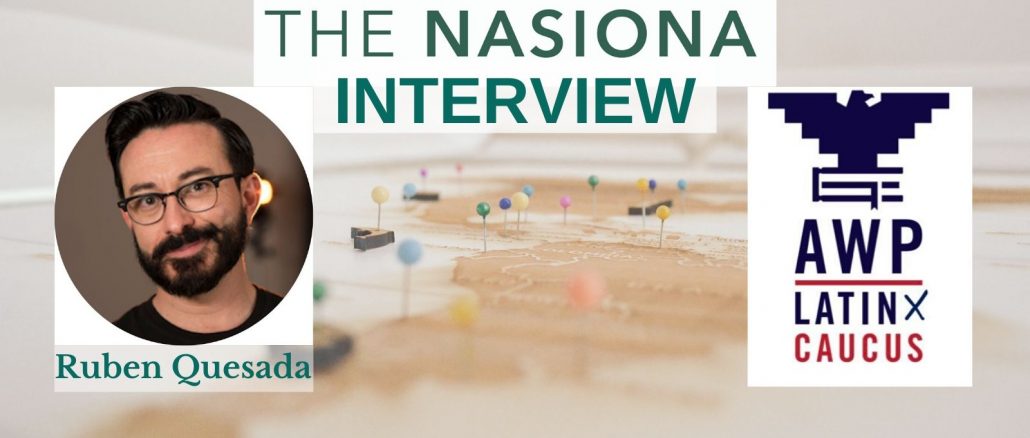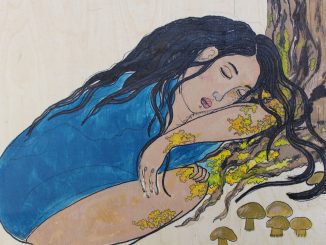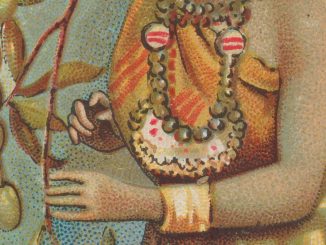
We speak with Ruben Quesada, founder of the Latinx Writers Caucus, to discuss what Latinx means to him, why he felt the need to create the Latinx Writers Caucus, advice he would give Latinx writers, Latinx voices and the industry, and more.
Quesada is the author of Revelations (2018), Next Extinct Mammal (2011) and Exile from the Throne of Night: Selected Translations of Luis Cernuda (2008). He has taught poetry, translation and publishing at Northwestern University, The School of the Art Institute, Vermont College of Fine Arts, and UCLA Writers’ Program. He served formerly as contributing editor of Chicago Review of Books, essays editor of The Rumpus, and blogger at Ploughshares. Currently, he serves as poetry editor at AGNI.
Imagine you are a character in a story you are writing. How might you introduce yourself?
You would find me sitting at park bench on a hill overlooking a city skyline near the coast. I am reading a book. The sky is a blue-pink color peeking through fat, scuddy clouds. Around me, people are sunning themselves. The grass is soft and verdant. When I turn a page, I look past the book. It is the perfect day to people watch. On days like this people are at their happiest, including me.
What does it mean to be Latinx to you?
To be Latinx is complicated for me. This experience is intricately different for everyone who identifies as Latinx. When I was younger, I believed it meant something specific. It meant something that was defined by a white, cishet, Christian system that propagated stereotypes in media like Speedy Gonzalez and gang-bangers. I was always looking for a role model. Someone who was a queer, first-generation POC. I grew up in a predominantly Mexican/Mexican American neighborhood in Los Angeles. It is important to note that someone of Mexican descent is not entirely the same as someone who is Latin American. From country to country, as European or Asian countries, Latinx cultures and identities are unique.
I never fully embraced the American idiom and I was never fully Costa Rican either. My Spanish tongue became a mix of Mexican colloquialisms shaped by US and Costa Rican culture. Both cultures were always somewhat of a mystery to me. Though I was never punished for speaking Spanish at school, my practice was relegated to privacy of home. This bifurcated identity in public and private spaces became like a shadow—a more complicated and subjugated consciousness, discrete and to remain within a smaller group of friends as I went to graduate school. It is important to acknowledge that less than one percent of Latinx people in the US hold a PhD. The further into higher education the more alone I became.
In 1946, Costa Rica became the only country in Central America and only one of the few countries on this planet to dissolve its military. The country’s resolve to face challenges that lends itself to the preservation of life has contributed to its peoples’ longevity. The people of Costa Rica, Ticos, have some of the longest lifespans of any people on this planet. Like Ticos, I value humanity and peace.
Peace is not to be mistaken for passive or naïve. I do not lack wisdom nor judgement about the world and the ways in which people navigate this world. While many of these traits are certainly inherent in many people, it is a generosity of spirit that thrives in Latinx people. I have heard it described as a light. If you have ever met me face to face, you would know what I mean. You would see the light.
What is the Latinx Writers Caucus and why did you feel the need to create it?
The Latinx Writers Caucus is an advocacy group started in 2015 within the Association of Writers & Writing Programs. Initially it was created as an oversight group to ensure the visibility and inclusion of Latinx poets, writers, and editors in the literary community and especially for participants at the annual AWP Conference & Bookfair. Over the last four years the organization has grown beyond the annual conference to host and support events and initiatives by groups and individuals that educate and advocate for the visibility of Latinx and Latin American writers around the world.
I was moved to create this organization because I wanted to bring awareness and attention to Latinx writers and the value of their work in the making and history of US culture.
What advice would you give Latinx writers?
Many years ago, when I first started the Latinx Writers Caucus, I was surprised to find how little writers championed the success of other writers much less themselves. If there is one piece of unsolicited advice I could offer, I recommend people not hesitate to share their accomplishments and recognize the accomplishments of others in the world. I have often heard it said that we create our own cannon by recognizing the work of those who appeal to us, that seems to be a myopic approach. Our culture in the US does little to recognize fine art and a failure to draw attention to work that is made further feeds into the mindset that art is not valuable. There is great value in the arts. And to walk by a work of art, in real life or online, is like ignoring a call for help. Nobody is asking you to put together an edited collection of work you admire, nobody is asking you to teach their work … All I am saying is, if you can’t take a few seconds to recognize work by someone, whether you know them or not, you are just a bad a someone who does not value art at all and dismisses its value in our culture. You are aligning yourself with the gatekeepers who have marginalized voices.
Why is it important for Latinx writers to have their voices represented and included in the mainstream?
I believe it is important for Latinx writers to have their voices represented in contemporary and historical culture. We must begin to do it for ourselves. We must demonstrate the value we find in each other. We must draw attention to ourselves.
It is essential for Latinx writers to be included and to be visible in all aspects of culture. As many people understand, history as we know it is driven and documented by those in power. Institutional memory—books, museums, archives—will outlast most generations. It is vital for Latinx people and all their nuances to be visible and to be documented.
I think of the work one man set into motion and what is now the Schomburg center. It was created by Arturo Alfonso Schomburg, a Puerto Rican, Black scholar of the early twentieth century. This is one prominent example of the work to preserve and exhibit the work and materials of peoples of “African American, African Diaspora, and African experiences African descent” and it endures today.
Currently, the Latino Center at the Smithsonian is working to establish its own museum site. The Center currently preserves and archives material on Latinx history and culture. In 2021 it will open a dedicated space on the US Latino experience at the National American History Museum.
Is your desire to create these spaces and opportunities for the Latinx community partly connected to personal challenges you’ve experienced in the industry? If so, can you share with us your personal story?
My desire to create these spaces and opportunities for the Latinx community are connected to my experience as a scholar and as an educator. As a student in the late twentieth-century I was fortunate to have teachers who exposed me to Latinx forerunners of Latinx literature. These authors included Rudolpho Anaya, Sandra Cisneros, Tomás Rivera, Gary Soto, and Julia Alvarez. It is important to remember who came before; that is, who opened the door for my work and for other Latinx writers.
How have you been excluded and underrepresented in the industry?
I do not think this question is particular to me as an individual. I see this as a question that applies more broadly to a people or culture experiences. Most of my graduate career focused on examining or creating taxonomies of US collections of poetry. If you examine collections of poetry published over the last two-hundred years, you will see a trend. Just as you see with any artform that serves to reflect the culture of a society and its people. The evolution of language and its representation of people, cultural experiences in the US has become broader and more inclusive of life and cultural experiences. To say I was excluded from the literary industry is to comment on those who hold power over publishing and distribution of information. Certainly, anyone involved in the literary community is aware of the shifts in visibility and inclusion.
What would you like to see in the industry to further include and better represent Latinx writers, voices, and stories?
Over the decade, writing by Latinx poets has received greater attention. In recent years, Latinx editors who manage the distribution and inclusion of Latinx writers in magazines has increased. It is these editors who have further contributed to the inclusion of Latinx stories. The industry needs to continue making room for Latinx people on their mastheads. I want to see Latinx people at The Paris Review, The New Yorker, POETRY—it is some of these long-standing and influential organizations that will serves as models who provide inclusion and visibility of more Latinx voices.
What ideas have you been thinking about lately?
I have been thinking about the degree to which we suffer or feel pain. There are people who are homeless in this country, children who are hungry and homeless … this is endemic to other countries as well. There are people who suffer in ways that are far worse than our own. The privilege and lack of awareness that I observe by some people can be upsetting. I have been trying to understand and be aware of my own privilege; there is a clear difference between being annoyed or irritated by something and actually feeling like it is the end of the line and I no longer want to live.
What do you look for when going through the slush pile of submissions for a publication?
I look through hundreds of submissions a month and in order to keep up with the demands of my editorial duties I have to trust my first impression. I am in a position where I only accept poems that show me something about an experience in a way that is so compelling, I do not want to stop reading. It can be a spectacle—recently, I accepted a poem where the use of language was so incredibly textured and dynamic that I simply wanted to read it again and again for the acrobatics of its diction and syntax. It was delightful. Sometimes a first line moves me so deeply that I want to learn more about the speaker. If I am not moved by the first few lines of poem, I am already put off. To say I look for one specific thing in a submission is difficult. I will acknowledge that a poem must delight or instruct; this adage has been true for millennia and it holds true for me.
GUEST
Founder of Latinx Writers Caucus
Ruben Quesada is the author of Revelations (2018), Next Extinct Mammal (2011) and Exile from the Throne of Night: Selected Translations of Luis Cernuda (2008). He has taught poetry, translation and publishing at Northwestern University, The School of the Art Institute, Vermont College of Fine Arts, and UCLA Writers’ Program. He served formerly as contributing editor of Chicago Review of Books, essays editor of The Rumpus, and blogger at Ploughshares. Currently, he serves as poetry editor at AGNI.
INTERVIEWER

Julián Esteban Torres López is a Colombian-born journalist, publisher, podcaster, and editor. Before founding the nonfiction storytelling organization The Nasiona, he ran several cultural and arts organizations, edited journals and books, was a social justice and public history researcher, wrote a column for Colombia Reports, taught university courses, and managed a history museum. He’s a Pushcart Prize and Best Small Fictions nominee and has written two books on social justice. Torres López holds a bachelor’s in philosophy and in communication and a master’s in justice studies from University of New Hampshire and was a Ph.D. candidate at University of British Columbia Okanagan, where he focused on political science and Latin American studies.
Twitter: je_torres_lopez



